Abarth 500 595 695 vs BMW i5 – Which one offers the better deal?
Both models have their strengths – but which one suits you more?
Compare performance, efficiency, price and space directly: Abarth 500 595 695 or BMW i5?
Costs and Efficiency:
When it comes to price and running costs, the biggest differences usually appear. This is often where you see which car fits your budget better in the long run.
Abarth 500 595 695 has a significantly advantage in terms of price – it starts at 32600 £, while the BMW i5 costs 60200 £. That’s a price difference of around 27609 £.
In terms of energy consumption, the advantage goes to the BMW i5: with 14.70 kWh per 100 km, it’s a bit more efficient than the Abarth 500 595 695 with 17.10 kWh. That’s a difference of about 2.40 kWh.
As for range, the BMW i5 performs decisively better – achieving up to 627 km, about 362 km more than the Abarth 500 595 695.
Engine and Performance:
Power, torque and acceleration say a lot about how a car feels on the road. This is where you see which model delivers more driving dynamics.
When it comes to engine power, the BMW i5 has a clearly edge – offering 601 HP compared to 155 HP. That’s roughly 446 HP more horsepower.
In acceleration from 0 to 100 km/h, the BMW i5 is decisively quicker – completing the sprint in 3.80 s, while the Abarth 500 595 695 takes 7 s. That’s about 3.20 s faster.
In terms of top speed, the BMW i5 performs evident better – reaching 230 km/h, while the Abarth 500 595 695 tops out at 155 km/h. The difference is around 75 km/h.
There’s also a difference in torque: BMW i5 pulls clearly stronger with 820 Nm compared to 235 Nm. That’s about 585 Nm difference.
Space and Everyday Use:
Whether family car or daily driver – which one offers more room, flexibility and comfort?
Seats: BMW i5 offers slightly more seating capacity – 5 vs 4.
In curb weight, Abarth 500 595 695 is convincingly lighter – 1410 kg compared to 2195 kg. The difference is around 785 kg.
In terms of boot space, the BMW i5 offers decisively more room – 490 L compared to 185 L. That’s a difference of about 305 L.
When it comes to payload, BMW i5 evident takes the win – 545 kg compared to 385 kg. That’s a difference of about 160 kg.
Who comes out on top?
Overall, the BMW i5 shows itself to be wins the duel decisively and secures the title of DriveDuel Champion.
It convinces with the more balanced overall package and proves to be the more versatile choice for everyday use.
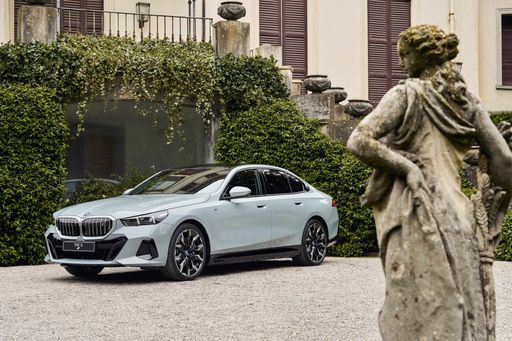 @ BMW Group Press
@ BMW Group Press
BMW i5
Abarth 500 595 695
The Abarth 500, particularly in its 595 and 695 renditions, captures the spirit of Italian motoring with its compact yet aggressive design. Known for its lively performance and distinctive styling, this little powerhouse is a joy to drive, offering an engaging experience that appeals to enthusiasts. With its rich motorsport heritage, the Abarth 500 embodies the essence of fun and excitement on both the streets and the race track.
details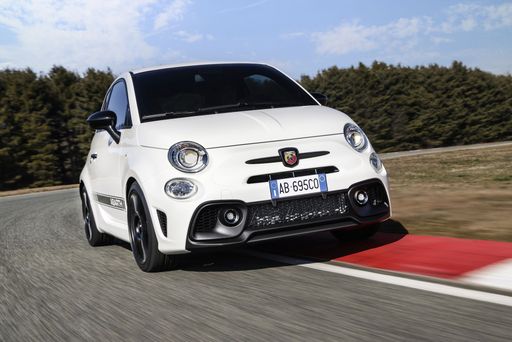 @ Abarth / Stellantis Media
@ Abarth / Stellantis Media
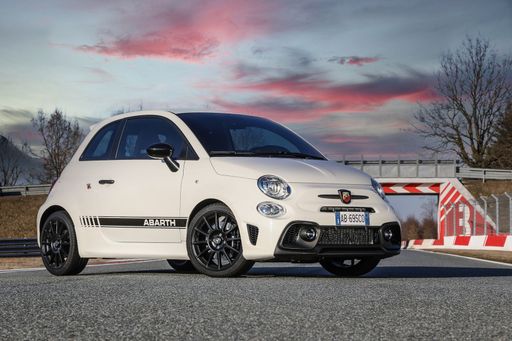 @ Abarth / Stellantis Media
@ Abarth / Stellantis Media
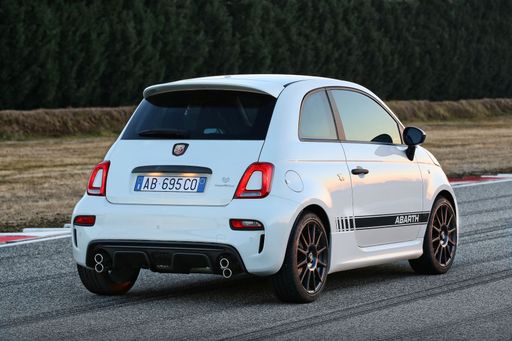 @ Abarth / Stellantis Media
@ Abarth / Stellantis Media
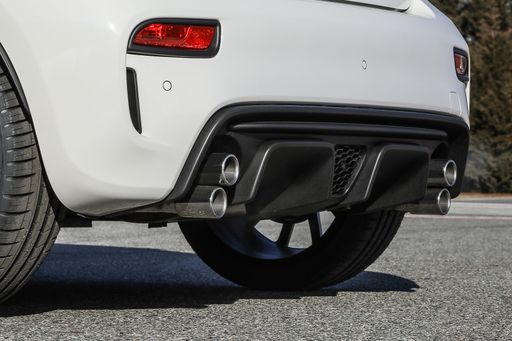 @ Abarth / Stellantis Media
@ Abarth / Stellantis Media
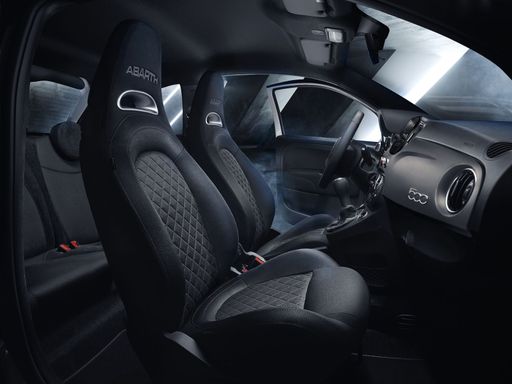 @ Abarth / Stellantis Media
@ Abarth / Stellantis Media
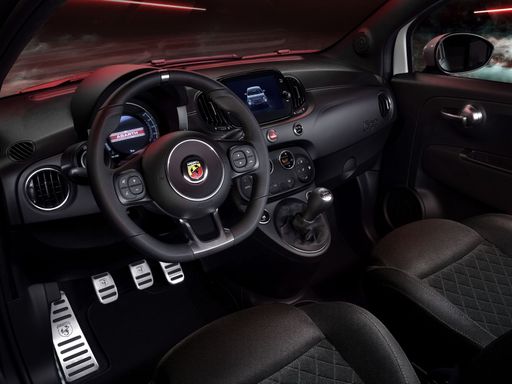 @ Abarth / Stellantis Media
@ Abarth / Stellantis Media
BMW i5
The sleek new i5 captivates drivers with its striking design and innovative features that blend luxury and efficiency. Inside, the spacious cabin boasts cutting-edge technology, ensuring a connected and comfortable ride for all passengers. Whether navigating city streets or embarking on a weekend getaway, the i5 delivers a dynamic driving experience that is sure to impress.
details @ BMW Group Press
@ BMW Group Press
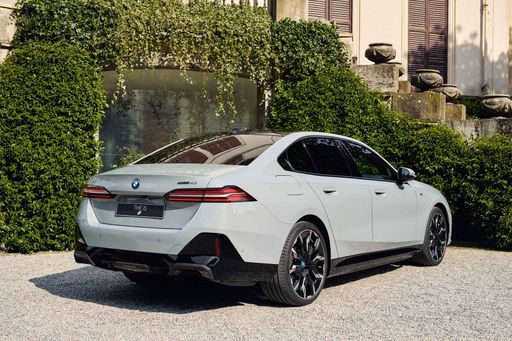 @ BMW Group Press
@ BMW Group Press
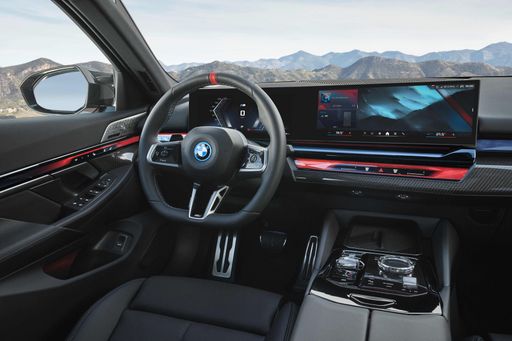 @ BMW Group Press
@ BMW Group Press
 @ Abarth / Stellantis Media
@ Abarth / Stellantis Media
|
 @ BMW Group Press
@ BMW Group Press
|
|
|
|
Costs and Consumption |
|
|---|---|
|
Price
32600 - 39400 £
|
Price
60200 - 85300 £
|
|
Consumption L/100km
-
|
Consumption L/100km
-
|
|
Consumption kWh/100km
17.1 - 18.8 kWh
|
Consumption kWh/100km
14.7 - 17.1 kWh
|
|
Electric Range
242 - 265 km
|
Electric Range
540 - 627 km
|
|
Battery Capacity
37.80 kWh
|
Battery Capacity
81.20 kWh
|
|
co2
0 g/km
|
co2
0 g/km
|
|
Fuel tank capacity
-
|
Fuel tank capacity
-
|
Dimensions and Body |
|
|---|---|
|
Body Type
Hatchback
|
Body Type
Sedan
|
|
Seats
4
|
Seats
5
|
|
Doors
3
|
Doors
4
|
|
Curb weight
1410 - 1435 kg
|
Curb weight
2195 - 2370 kg
|
|
Trunk capacity
185 L
|
Trunk capacity
490 L
|
|
Length
3673 mm
|
Length
5060 mm
|
|
Width
1682 mm
|
Width
1900 mm
|
|
Height
1518 mm
|
Height
1505 - 1515 mm
|
|
Max trunk capacity
550 L
|
Max trunk capacity
-
|
|
Payload
370 - 385 kg
|
Payload
525 - 545 kg
|
Engine and Performance |
|
|---|---|
|
Engine Type
Electric
|
Engine Type
Electric
|
|
Transmission
Automatic
|
Transmission
Automatic
|
|
Transmission Detail
-
|
Transmission Detail
Reduction Gearbox
|
|
Drive Type
Front-Wheel Drive
|
Drive Type
Rear-Wheel Drive, All-Wheel Drive
|
|
Power HP
155 HP
|
Power HP
340 - 601 HP
|
|
Acceleration 0-100km/h
7 s
|
Acceleration 0-100km/h
3.8 - 6 s
|
|
Max Speed
155 km/h
|
Max Speed
193 - 230 km/h
|
|
Torque
235 Nm
|
Torque
430 - 820 Nm
|
|
Number of Cylinders
-
|
Number of Cylinders
-
|
|
Power kW
114 kW
|
Power kW
250 - 442 kW
|
|
Engine capacity
-
|
Engine capacity
-
|
General |
|
|---|---|
|
Model Year
2023
|
Model Year
2023 - 2024
|
|
CO2 Efficiency Class
A
|
CO2 Efficiency Class
A
|
|
Brand
Abarth
|
Brand
BMW
|
Is the Abarth 500 595 695 offered with different drivetrains?
The Abarth 500 595 695 is offered with Front-Wheel Drive.
The prices and data displayed are estimates based on German list prices and may vary by country. This information is not legally binding.
